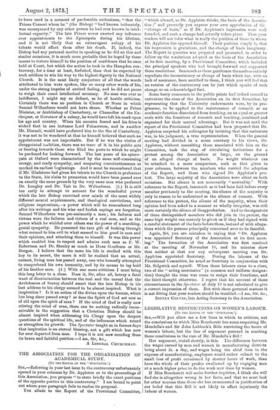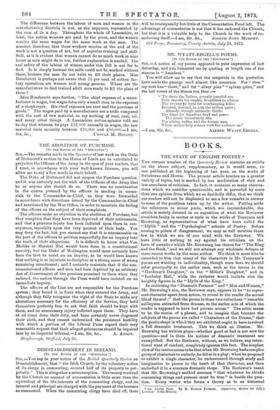LEGISLATIVE RESTRICTIONS ON WOMEN'S LABOUR. [TO TILE EDITOR OF THE
"SPECTATOR.1 SIR,—Will you allow me a few lines in which to criticise, not the conclusions to which Miss Boucherett has come respecting Mr. Mundella's and Sir John Lubbock's Bills restricting the hours of women's labour, but the line of argument pursued in reaching those conclusions in the case of Mr. Mundella's Bill ?
Her argument, stated shortly, is this. The difference between the wages earned by men and women in manufacturing districts being about 2s. a day, and wages being the chief item in the expense of manufacturing, employers would rather submit to the small loss of profit occasioned by shorter hours of work, than have the whole of their profits swallowed up by engaging men at a much higher price to do the work now done by women.
If Miss Boucherett will make further inquiries, I think she will find she is altogether wrong in her facts, and that we must look for other reasons than those she has enumerated in justification of our belief that this Bill is not likely to affect injuriously the labour of women. The difference between the labour of men and women in the manufacturing districts is not, as she supposes, represented by the sum of 2s. a day. Throughout the whole of Lancashire, at least, the cotton weavers are paid by the piece, and the women receive the same wages for the same work as the men. The amount, therefore, that these workers receive at the end of the week is not a question of sex, but of superior training and skill. Still, as it is evident that women cannot do as much work in nine hours as men might do in ten, further explanation is needed. The real safety of the labour of women under this Bill is not far to find. It is simply because the mills could not be worked without them, because the men do not exist to fill their places. Miss Boucherett is perhaps not aware that 75 per cent. of cotton fac- tory operatives are women and young persons. Where are the manufacturers to find trained adult men ready to fill the place of these ?
Miss Boucherett says further, "The chief expense of a manu- facturer is wages, but wages form only a small item in the expenses of a shopkeeper. His chief expenses are rent and the purchase of goods." The wages paid by a manufacturer are a trifle compared with the cost of raw material, to say nothing of rent, coal, oil, and many other things. A Lancashire cotton-spinner told me to-day that whereas he pays £12,000 annually in wages, the raw material costs annually between £70,000 and £80,000.—I am,































 Previous page
Previous page